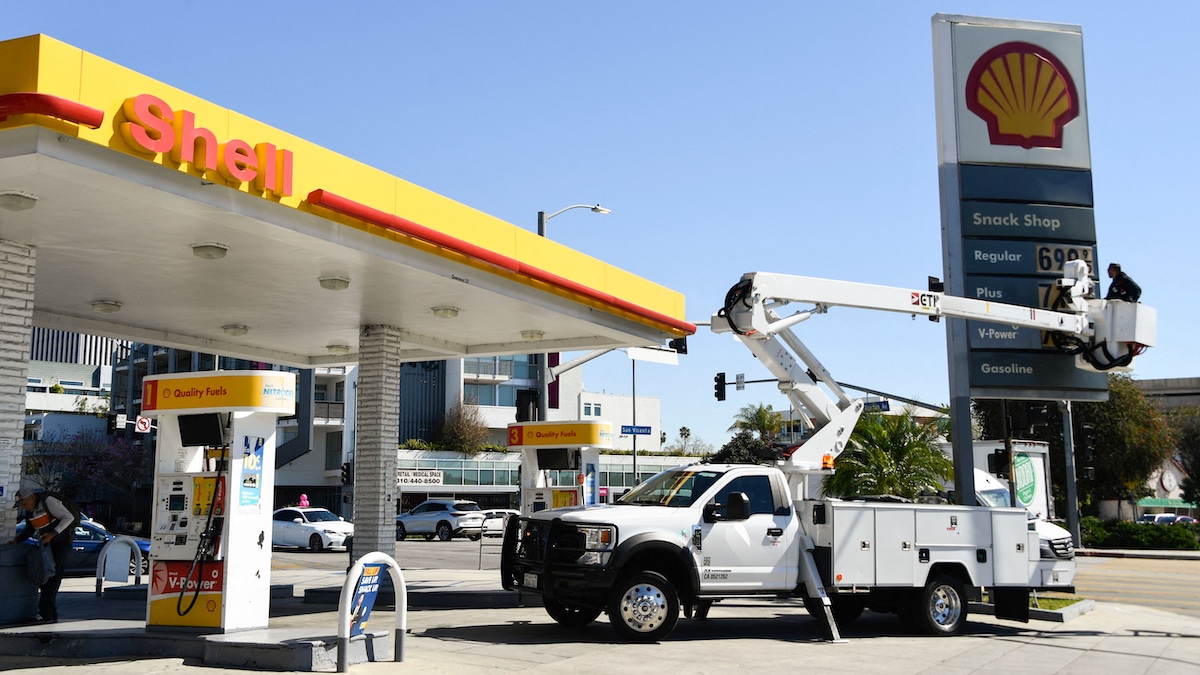Los Angeles Considers Ban on New Gas Stations

 Why you can trust us
Why you can trust us
Founded in 2005 as an Ohio-based environmental newspaper, EcoWatch is a digital platform dedicated to publishing quality, science-based content on environmental issues, causes, and solutions.
Could Los Angeles become the largest city yet to ban the construction of new gas stations?
The idea might seem improbable. The City of Angels is infamous for its reliance on cars. Its public transit system is considered one of the worst in the world, according to Jalopnik, and the amount of cars on the road meant that LA commuters wasted 46 hours each in traffic in 2020, according to the Urban Mobility Report. Despite this, the city announced on Wednesday that it was joining a growing movement of metropolises looking to stop adding gas stations.
“We are ending oil drilling in Los Angeles. We are moving to all-electric new construction. And we are building toward fossil fuel free transportation,” LA Councilmember Paul Koretz, who wrote the proposed policy, said in a statement. “Our great and influential city, which grew up around the automobile, is the perfect place to figure out how to move off the gas-powered car.”
In developing its no-new-gas-station policy, LA is joining the SAFE Cities movement, a project of the nonprofit Stand.earth, The Guardian reported. This is a movement linking local groups working to keep their communities “safe” from fossil fuels by taking measures like banning new fossil fuel infrastructure and transitioning to renewable energy, the website explained.
In a new report, SAFE Cities said there were four key reasons to stop building new gas stations:
- They harm the local environment: Gas stations can cause spills that pollute soil and water and release carcinogenic chemicals like benzene.
- They are a financial risk: Up to 80 percent of gas stations in the U.S. and Canada could be unprofitable in 15 years, according to a recent study, and when they shutter they are expensive to clean up.
- The climate crisis: Transportation is the leading cause of greenhouse gas emissions in the U.S. and the second leading cause in Canada. Halting construction of new gas stations can send a signal that new gas cars are not needed or wanted.
- The future is electric: With the Biden administration and many cities promoting a transition to electric vehicles and charging stations, new gas stations could become stranded assets.
The movement away from gas stations began in March of 2021, when Petaluma, California, became the first U.S. city to ban new gas stations, as Grist reported.
“We are not surprised that many cities are following our lead to prohibit the development of new gas stations,” Petaluma Council Member D’Lynda Fischer said in a statement. “We have an obligation to stop fossil fuel expansion and new gas stations lock communities into many kinds of risks. This is one of many steps Petaluma is taking. We are proud to be part of this growing movement to stop fossil fuel expansion and phase out fossil fuels.”
Since Petaluma made its move, other California cities have followed suit, including Rohnert Park and Sebastopol. In addition to Los Angeles, the Californian cities of Windsor, Cotati and Santa Rosa all have policies in development, as do Bethlehem, New York, and Comox Valley Regional District, British Columbia. These mark the first such policies on the table in New York and Canada.
The movement comes as gas prices are soaring. California has the highest in the nation, at $6.37 per gallon on average, Grist reported. But campaigners say building new stations isn’t the answer.
“Prohibiting construction of new gas stations is not going to do anything to impact gas prices right now,” SAFE Cities senior advisor Anne Pernick told Grist. “But the cost of new gas stations in terms of the health, equity, and safety of the community, as well as future stranded assets, is a bill that definitely ends up being paid by public dollars.”
In Los Angeles, Koretz hopes the policy will advance by the end of 2022, staffer Andy Shrader told The Guardian.
“Our daily bad habits are destroying the natural systems we depend on to exist. It’s really up to cities to turn around climate change,” Shrader said. “If you have lung cancer you stop smoking. If your planet is on fire, you stop throwing gasoline on it.”
Subscribe to get exclusive updates in our daily newsletter!
By signing up, you agree to the Terms of Use and Privacy Policy & to receive electronic communications from EcoWatch Media Group, which may include marketing promotions, advertisements and sponsored content.

 233k
233k  41k
41k  Subscribe
Subscribe 




